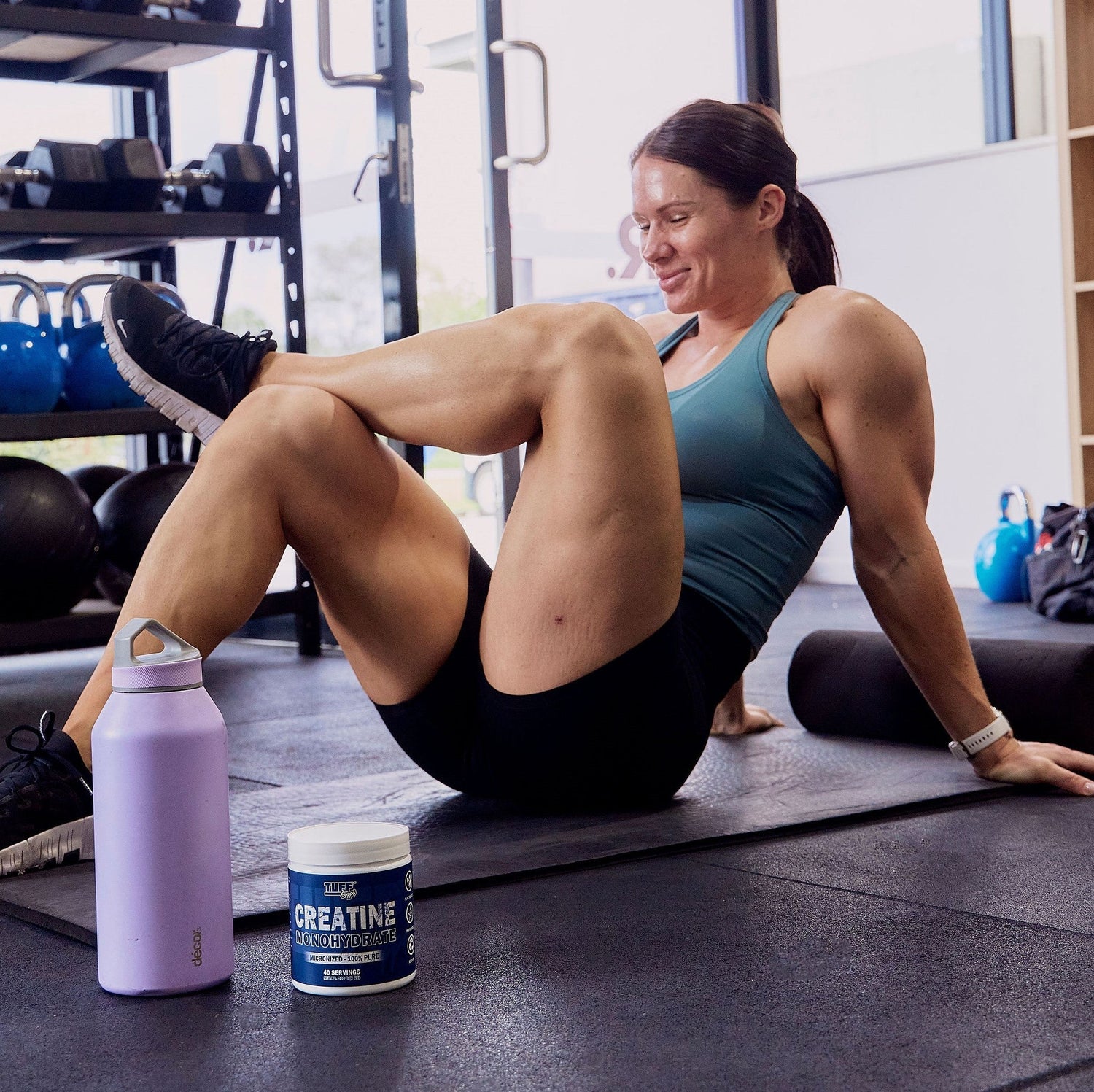When most people think creatine, they picture gym bags, heavy squats, and faster recovery. That’s still true — but science is uncovering a much bigger picture.
Recent studies show creatine may help with cognitive performance, ageing well, metabolic health, and even coping with sleep loss. At Tuff Supps, we’ve taken a deep dive into the latest research so you know exactly why creatine isn’t just for lifters anymore.
What Is Creatine and How Does It Work?
Creatine is a naturally occurring compound made in the liver, kidneys, and pancreas, and also found in foods like meat and fish.
Its superpower is stored as phosphocreatine in tissues with high energy demands — like your muscles and brain. This system acts like a rechargeable battery, instantly topping up ATP (the body’s energy currency) whenever demand spikes.
That’s why creatine is famous for gym performance. But the same mechanism also explains why new studies are finding benefits in the brain, metabolism, and ageing.
Creatine Benefits Beyond the Gym
1. Brain Health and Cognitive Performance
-
Memory and reasoning: A 6-week trial of 5 g/day creatine showed improvements in working memory and reasoning ability in adults. Effects were strongest in groups under energy stress.
-
Sleep deprivation: In lab studies, a single high dose (~0.3–0.35 g/kg, e.g., 20–25 g) after poor sleep boosted short-term memory, processing speed, and attention.
-
Older adults: Systematic reviews suggest creatine can support cognitive domains like memory and processing speed, especially in people over 50.
Takeaway: Creatine may help your brain perform under stress — whether that’s lack of sleep, mental fatigue, or natural age-related decline.
2. Healthy Ageing, Muscle and Bone
-
Creatine with resistance training is a proven combination for slowing muscle loss (sarcopenia).
-
Research also points to potential benefits for bone health and functional independence in older adults.
-
Staying strong and mobile as we age doesn’t just mean lifting weights — it means keeping energy systems topped up across body and brain.
3. Metabolic Support
-
In clinical trials, adults with type 2 diabetes who combined exercise with creatine supplementation improved their glucose control and insulin sensitivity.
-
While this is still early research, it highlights creatine’s potential role in supporting metabolic health — particularly when paired with training.
Compliance note: Always phrase as “studies suggest” or “research indicates.” For anyone with medical conditions, consultation with a healthcare professional is essential.
4. Mood, Stress and Resilience
-
Beyond performance, creatine is being studied for roles in mood and resilience.
-
Mechanisms may include reducing oxidative stress, improving energy buffering in neurons, and supporting neurotransmitter balance.
-
Early work even points to potential benefits in long-COVID related “brain fog.”
How to Use Creatine for Broader Benefits
| Goal | What studies used | Who benefits most |
|---|---|---|
| Daily brain support | 3–5 g/day for ≥6 weeks | Older adults, vegetarians/vegans, high cognitive load |
| Sleep-deprivation rescue | Single high dose ~0.3 g/kg (short-term, supervised) | Shift workers, students, long-haul travellers |
| Ageing strong | 3–5 g/day + resistance training | Adults 50+ aiming to maintain function & independence |
| Metabolic support | ~5 g/day with training | Adults with insulin resistance/T2D under guidance |
Tip: For general health and performance, a consistent 3–5 g/day is the gold standard. “Loading” (20 g/day for 5–7 days) can saturate stores faster but isn’t essential.
Is Creatine Safe?
-
Most researched sports supplement: Hundreds of trials show creatine monohydrate is safe for healthy adults.
-
Long-term use: Doses of 3–5 g/day have been safely studied for years.
-
Precautions: People with kidney disease or those on certain medications should seek professional advice.
Mandatory Australian labelling (FSSF products): “Not suitable for children under 15 years or pregnant women: should only be used under medical or dietetic supervision.”
Why Choose Tuff Supps Creatine?
At Tuff Supps, we believe in keeping things simple, pure, and effective.
-
100% creatine monohydrate — the exact form used in nearly all the clinical studies.
-
Unflavoured and stack-friendly — mix with your protein or pre-workout.
-
Trusted quality — tested for purity so you know exactly what you’re getting.
This is creatine the way it’s meant to be: evidence-based, transparent, and tailored to modern needs.
Frequently Asked Questions
Q: Do I need to cycle creatine?
No. Consistent daily use is safe and effective — no cycling required.
Q: Can vegetarians or vegans benefit more from creatine?
Yes. Because creatine is mostly found in animal foods, plant-based eaters often have lower stores and respond strongly to supplementation.
Q: How soon will I notice benefits?
For performance, usually within weeks once muscle stores are saturated. For cognitive or ageing-related outcomes, studies suggest at least 4–6 weeks of consistent use.
Final Thoughts
Creatine is moving beyond its reputation as “just a gym supplement.” The science now points to benefits in brain function, ageing, metabolic support, and stress resilience.
If you’re looking for an affordable, safe, and research-backed supplement that goes beyond the barbell, Tuff Supps Creatine Monohydrate is a smart choice.
Suggested keywords: creatine benefits, creatine monohydrate, brain health, healthy ageing, creatine safety, creatine cognition, creatine metabolism, creatine Australia

